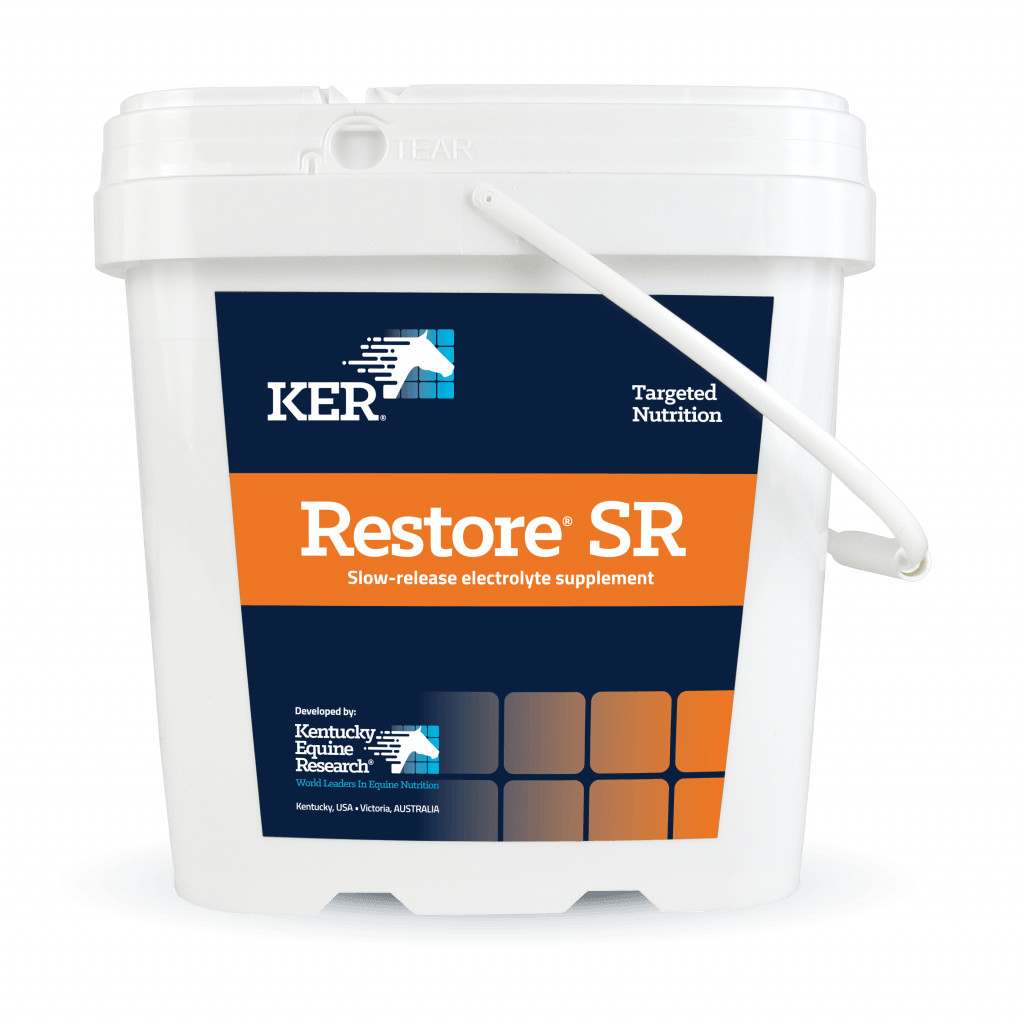RACEHORSES

When it comes to nutritional requirements, racehorses are in a class of their own. The demands of race training put stresses on a horse's body above and beyond those normally encountered by most other performance horses.
Racing and the associated changes in diet and management can put racehorses at risk for problems such as degenerative joint disease, electrolyte imbalance, and digestive issues and resulting stable vices.
Kentucky Equine Research (KER) performs routine in vivo quality control studies to ensure that all KER-affiliated feeds, ingredients, and supplements are free from prohibited substances.
Which solutions are right for your stable?

DuraPlex® Bone mineralization supplement. DuraPlex is a proprietary blend of specific proteins, minerals, and vitamins scientifically proven to increase bone mineral density and bone area in both performance and growing horses. Ideal for horses who spend the bulk of their time stabled, including those undergoing lay-ups, and those with a bone injury or recovering from surgery.
EO-3™ Omega-3 supplement. EO-3 is a rich source of omega-3 fatty acids DHA and EPA, compounds that have been shown to promote optimal cardiovascular function, particularly in horses with EIPH. Choose EO-3 to balance fatty acids, benefiting joint health, immune, respiratory, and cardiovascular function.
Micro-Max™ Ration fortifier. Micro-Max is a low-intake concentrated source of vitamins and minerals for mature horses. Micro-Max is ideal for horses that are fed diets of forage and straight cereal grains. The use of Micro-Max ensures that all vitamin and mineral requirements are satisfied.
Nano-E® Highly bioavailable source of vitamin E. Recommended for horses that spend a significant portion of their time in stalls or otherwise confined, including horses whose forage intake is largely from hay rather than pasture, those experiencing stress, convalescent horses, and those with neurological problems.
Nano-Q10™ Antioxidant for horses in training. Coenzyme Q10 is a powerful antioxidant that improves aerobic energy generation while protecting against exercise-induced muscle damage. Nano-Q10™ is a rapidly absorbed source of coenzyme Q10 that is three times more bioavailable than the powdered crystalline form.
Race Recovery™ Racing optimized electrolyte. Race Recovery Paste and Powder are innovative electrolyte supplements designed specifically for horses given furosemide. Race Recovery provides targeted electrolyte supplementation, supporting a quick rebound from hard work.
Restore® SR Slow-release electrolyte powder.Restore SR includes a slow-release mechanism for sustained absorption. Choose Restore SR for daily replacement of electrolytes lost in sweat.
RiteTrac™ Total digestive tract support. A proprietary blend of ingredients designed to support total digestive tract health. RiteTrac works in two distinct ways. First, with its combination of fast-acting antacids and coating agents, RiteTrac quickly neutralizes excessive gastric acid, protecting the stomach lining and restoring the normal gastric environment. Second, RiteTrac contains EquiShure, a time-released hindgut buffer designed to minimize the effects of hindgut acidosis, which can include colic and laminitis.
Synovate HA® Liquid sodium hyaluronate. Synovate HA provides horses with a safe, highly digestible form of sodium hyaluronate for the support of healthy joint function. Choose Synovate HA to promote healthy cartilage and optimal synovial fluid viscosity for proactive management of joint health.
Total Wellness™ Complete performance formula. Provide antioxidant, joint, digestibility, and hoof and coat support with one easy-to-feed product.

Triacton™ Bone and digestive health support. Triacton is a triple-action supplement designed to improve bone density and support digestive health in horses. The pelleted supplement contains an array of highly bioavailable minerals and vitamins essential for sound skeletal development and maintenance, as well as optimal function of the gastrointestinal tract.
Tips for the Nutritional Management of the Racehorse
- Deliver sufficient energy intake. The energy requirement of horses in race training is significantly higher than almost all other types of performance horses; forage alone cannot provide sufficient calories. Racehorses often need a large amount of supplemental feed (1-1.5% of the horse’s body weight).
- Provide appropriate nutrient intake. Hay and cereal grains are low in certain vitamins and minerals needed for optimal performance. If a fortified concentrate is not being fed as directed, or if straight cereal grains are fed, supplement to ensure optimal levels of nutrients are supplied.
- Replenish electrolytes. Electrolytes play key roles in transmission of nerve impulses and muscle contraction. Horses with insufficient electrolytes are at risk for earlier onset of fatigue and therefore have less stamina. Racehorses lose more electrolytes in daily training than the typical 2 ounces (60 g) of free-choice salt intake can replenish. Horses that race or train on furosemide lose higher quantities of these minerals and require targeted replacement to support recovery.
- Support muscle health and speed recovery. Muscle contractions during work lead to the production of free radicals, which can damage muscle cells. Certain nutrients act as antioxidants, reducing the risk of muscle damage and supporting improved recovery.
- Maintain digestive health. Horses that consume a high level of grain, are stabled without turnout, and undergo the stress of training and competition often end up with gastric ulcers, hindgut acidosis, signs of colic, and stable vices like cribbing.
- Promote soundness and longevity. Training and racing at high speeds can lead to significant wear and tear on joints. Even sound horses may exhibit shorter stride length due to minor discomfort.
- Maintain bone quality. KER research shows stall confinement can lead to bone demineralization and weakening in as few as two weeks. Additionally, horses initially entering race training will typically lose bone density during the first few months of training, potentially putting them at increased risk for training setbacks such as bucked shins as they start fast work.
Related collections
Growing Horses. Growing horses can encounter various management situations that may derail proper growth, such as long periods of stalling, poor pasture, feeding below the recommended amount of formulated feed, and even overfeeding (or overconsumption of calories). In these situations careful nutritional management and supplementation may aid in supporting healthy growth progress. See the Growing Horse collection.
Broodmare. Various aspects of pregnancy and foaling can be supported and, in some cases, improved through specific nutritional support. See the Broodmare collection.
Breeding Stallion. Breeding stallions require a carefully balanced diet to maintain optimal body condition and fertility. Certain aspects of stallion reproduction have been shown to be improved by supplementation. See the Breeding Stallion collection.
Special Needs. Targeted support for horses with specific medical issues. See the Special Needs collection.
Learn More
- What Happens to the Skeleton During Early Training of Racehorses?
- Athletic Horses: Supplements to Maximize Bone Health
- Furosemide Use in Racehorses: A Nutritional Perspective
- Omeprazole and Calcium Digestibility: What Horse Owners Should Know
- Feeding Horses Before Exercise: What to Feed and When?
-
Antioxidant Use in Equine Athletes with Muscle Fatigue, Damage
- Choose Natural Vitamin E for Exercising Horses
- An Introduction to Coenzyme Q10 for Athletic Horses
-
Poor Racing Performance Due To Equine Asthma
- Omega-3s and Inflammation in Athletic Horses
- Maintaining Joint Health in Horses
- Antioxidants for GGT Syndrome in Training Racehorses
- Skeletal Morphology Among Racing Thoroughbreds and Quarter Horses
-
Health Considerations for Retired Racehorses




















